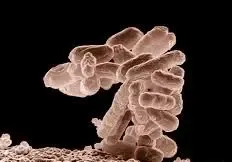Outbreak of Shiga Toxin-Producing E. coli Affects 53 Individuals in Latvia

Synopsis
Key Takeaways
- 53 individuals affected, including 7 adults
- 28 schools reported E. coli cases
- Children's Clinical University Hospital treating 28 children
- Investigation ongoing to identify infection source
- STEC strains cause severe foodborne illness
Riga, April 4 (NationPress) An outbreak of a dangerous Shiga toxin-producing E. coli infection has resulted in 53 individuals, including seven adults, falling ill in Latvia, as reported by the Centre for Disease Prevention and Control (CDC).
The CDC confirmed that cases of E. coli have emerged in 28 schools, 26 preschool institutions, and two elementary schools nationwide.
The Children's Clinical University Hospital in Riga has admitted 28 children suffering from the infection. As of Thursday, 12 have recovered and been discharged, while 16 remain hospitalized, with four in intensive care.
Epidemiologists are still working to pinpoint the source of the infection. Following extensive laboratory testing and contact tracing, investigators suspect the outbreak may be associated with contaminated food products. However, the CDC has not dismissed the possibility of a mixed-source outbreak, potentially involving a product tainted by multiple pathogens, according to the Xinhua news agency.
The CDC noted that Escherichia coli (E. coli) bacteria are generally found in the intestines of humans and animals, and most strains are harmless. Nevertheless, specific strains known as STEC or VTEC (Shiga toxin or verotoxin-producing E. coli) can produce harmful toxins that lead to severe health issues.
These dangerous strains can cause bloody diarrhoea and, in severe cases, acute kidney failure that necessitates intensive care. The primary reservoir for these harmful bacteria is herbivorous animals, especially cattle.
Last year, Latvia reported 42 cases of E. coli infection.
According to the World Health Organization, Escherichia coli (E. coli) is a bacterium commonly located in the gastrointestinal tract of humans and warm-blooded animals. While most strains of E. coli are harmless, some, like Shiga toxin-producing E. coli (STEC), can lead to severe foodborne illnesses. Transmission to humans primarily occurs through the consumption of contaminated foods, including raw or undercooked ground meat products, raw milk, and contaminated raw vegetables and sprouts.










